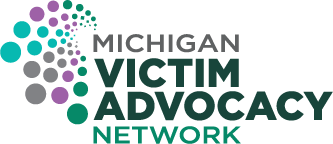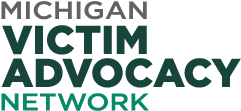Remembering To Help Ourselves, Too
Crime victims advocacy work is incredibly necessary. It can also be incredibly draining. Though we are often wholly committed to the survivors we serve and the work that we do, we have to remember to take care of us and take care of each other, too. Vicarious trauma, burnout, and compassion fatigue are real dangers to advocates in our collective work that we can be on the look out for.
In this month’s compilation, we collected resources and trainings that talk about advocate wellbeing. The resources offer suggestions that advocates themselves can do and also what can be done to support advocate wellbeing on an organizational level. As always, please don’t hesitate to contact us if you’re looking for more!

Help for the Helpers: Vicarious Trauma, Burnout, Compassion Fatigue, and Self-Care
October 2024
MiVAN and MCEDSV
Victim advocates may experience vicarious trauma, burnout, or compassion fatigue at some point in their career, but experiencing these challenges is treatable and preventable. In this course, we will learn how to recognize when doing the work is starting to take a toll, how to get help, and useful individual and workplace practices for caring for ourselves and each other in this work.
*You must be a registered member on MiVAN.org to enroll

When It’s More than “Just a Job”
April 2019
Dr. Johnanna Ganz at TEDx HamlineUniversity
“Our social world tells us that work is supposed to be more than just a job, that our careers should be about our deepest passions or our most important identities. This single message is a recipe for professional and personal disaster. Using her research and experience, Dr. Johnanna Ganz defines occupational identity and helps others understand the benefits and risks that come with being so work driven. She also addresses what actions you can take to build a healthier and happier relationship to your career and your life.”

Why is it important for advocates and social change makers to practice radical self-love?
August 2023
National Resource Center on Domestic Violence (NRCDV)
“And why is it important for us – advocates, healers, and social change makers – to practice radical self-love? Because radical self-love is a pathway toward individual and collective transformation… Contrary to what systems of oppression and marginalization want us to believe, we are interdependent beings. Our individual experiences impact one another. While radical self-love starts with us as individuals, it has the power to expand to our families and communities. In the end, it has the power to transform society as a whole.”

Applying Protective Factors to Social Worker Self-Care
September 2024
Center for the Study of Social Policy
“Protective factors are conditions and attributes, such as social connections or concrete support, that promote individual and family health and well-being. A recent brief from the Center for the Study of Social Policy explores how those protective factors can be applied to child welfare workers and their families.”
Self Care Techniques for Tribal Child Welfare Professionals
June 2019
Capacity Building Center for Tribes
“We have long known that when we focus on self-care, stress is reduced and our capacity to engage with families is increased, ultimately creating better outcomes for children and families. This webinar explored what it truly means to care for ourselves and how to make self-care an integral part of the structure and culture of our organization.”
Transforming Trauma Podcast: Creating Trauma-Informed Systems
April 2023
Sandra Bloom from Campaign for Trauma-Informed Policy and Practice
“What does it mean to be “trauma-informed,” and why should organizations make their workplace more trauma-informed? How can it improve well-being, safety, productivity, fulfillment, and growth? How do you build, implement, and sustainably maintain trauma-informed workplaces? Who is responsible for such endeavors? How do I get started? We aim to answer those questions and more with our podcast.”

Self-Care Tips for Student Activists, Advocates, and Allies
Counseling and Psychological Services at the University of Michigan
This short web-article offers clear, action-oriented tips for practice self-care. These tips include taking care of the physical self, setting firm boundaries, celebrating small successes, and more.

Trauma-Informed Workplaces: Concepts, Strategies, and tactics to Build Workplaces that Support Well-Being
April 2023
Battered Women’s Justice Project
“This toolkit provides educational concepts and practical strategies to support team members in advocating for more trauma-informed workplaces. …Creating trauma-informed spaces is not about checking action items off a definitive list or taking a series of prescribed steps that can be universalized across all settings. There is also no finite endpoint to this journey. Instead, implementing trauma-informed change involves a commitment to an ongoing reflection, evaluation, discovery, and reform process.”

